David J: “The Punches and the Kisses”
Setting the scene: it’s a balmy late afternoon in downtown Los Angeles, summer of 2010. An amazing feature opportunity has suddenly presented itself, bringing Zoetica and I together for an impromptu interview/photo shoot at the Standard Hotel— a populuxe wet-dream of a place with Jenny Holzer art and an imitation Calder mobile in its lobby. Our esteemed subject has agreed to meet us for a drink at the Googiegasmic 24/7 Restaurant on the ground floor.
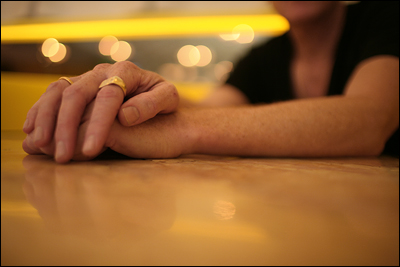
Photo by Zoetica Ebb.
Later in the evening, he’ll ride an elevator up to the swanky retro Rooftop Bar to DJ a killer set of “hyper lounge” for the likes of Sasha Grey, Mildred Von, the director of Lip Service, Miyu Decay, Andy Ristaino, Courtney Riot, and a slew of soused software convention-goers. But for now, he’s holding court at our corner table, and he’s got Zo and me doubled over in helpless fits of laughter. As our cackling reaches a crescendo, fellow patrons look up from their $20 cheeseburgers in confusion. Perhaps this pale, slim, soft spoken and immaculately dressed Englishman with the barest hint of a smile on his face isn’t the instigator they expected. One thing’s for sure: David J Haskins surprised the hell out of us! Delightfully so.
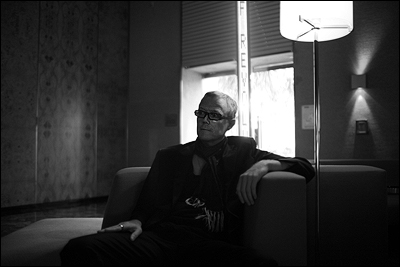
David J in the lobby of the downtown LA Standard Hotel. Photo by Zoetica Ebb.
As Zo sets up her next shot, I sip my coffee and ask the man who wrote the lyrics for Bauhaus‘ seminal song, “Bela Lugosi’s Dead” if vampirism is, in fact, the secret to his youthful appearance. “I’m actually very wrinkled from the waist down,” he says. Hastily, I wipe up my spit take. “Don’t print that.” Zo insists that we should print that. “Oh, all right. You can print that.” A few minutes later, he launches into an anecdote about “the infamous pan-flute monkey” from Love and Rockets’ music video for ‘No New Tale to Tell’: “The handler put peanuts down all of the pipe shafts.” The idea being that the monkey would try to tip them out to eat and appear to be playing the flute. “Worked out pretty well. But when the little bugger wasn’t trying to get at the peanuts,” (David J’s voice drops to a conspiratorial whisper) “he was wanking. Endlessly. For hours. Hours and hours. And staring at us.” Zo does her best to keep the camera steady. “It was quite impressive, actually! And a little terrifying. No one wanted to go near the filthy thing.”
Giggle fits notwithstanding, professionalism prevails. Zo gets some great shots, and in of spite being uncharacteristically twitterpated (can’t be helped; I smoked my very first clove while listening to “Who Killed Mister Moonlight“), I’m able to nab an in-depth, thoughtful interview from a most multifaceted and influential progenitor of post-punk alternative culture.
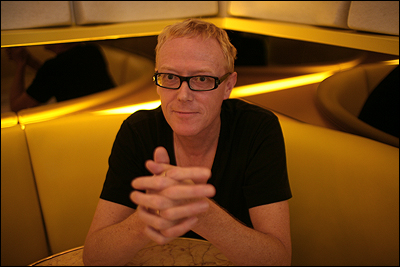
David J, making mischief at the Standard Hotel’s 24/7 Restaurant. Photo by Zoetica Ebb.
It’s hard to know where to begin with you! The range and diversity of the creative projects you’ve been involved with for over the course of your career is astounding. In addition to being a musician and a lyricist, you’re a visual artist, playwright … and more recently, you’ve even gotten into screenwriting?
Just in the last year, yes. I embarked on that with a partner, Don C. Tyler, and we have a fantastic chemistry. So far it’s going very well, it’s picking up. We have a couple of different scripts in the works. I am actually contracted not to talk about the subject matter of either of them, sorry, but I can tell you they’re tangentially connected. And yes, I’ve written some plays. I was going to say I just finished my second play, but really it’s the third, because initially, I got into writing for the stage after creating this 12-minute play about punk rock called Anarchy In The Gold Street Wimpy. It had never occurred me to write one before, but my publicist, Versa Manos, was friends with this theatre company in Atlanta, Georgia, called Dad’s Garage. They were looking for submissions for a theatrical presentation of short 12-minute plays based on the idea of punk rock. She suggested I should have a go at it, and so I did. I thought, well, I was there, after all. Going to shows in 1976, when punk rock was full-on.
You were in Northampton, UK at the time?
I was. I used to drive down the M1 motorway in my little Morris Minor to the 100 Club and places like that to see bands. The Sex Pistols. The Clash. So I wrote about that experience, and the play got accepted. It was great; they had about eight plays, including one from a Tony Award winner. High quality stuff. I flew out to see the production, and it was quite intoxicating to watch something that I had written properly staged by actors. They were very good. They didn’t get the accent quite right, [laughs] but what the hell, it was a great interpretation.
That’s what lead to you writing your full-length Edie Sedgwick play, Silver for Gold?
It did, yeah.
You were researching that really intensively for a long time. What was it like, living with Edie’s ghost for so long?
It was a couple of years. It really did feel like I was living with her ghost. Like a visitation, at times. And I became enamored of that feeling to a degree. I wanted it to happen. The way to evoke that presence was to keep writing, and to get it right. To get her right, actually. When the writing was crackling, then the spirit did manifest. That might sound sort of farfetched –well, maybe not to you, but to lots of people it probably would. It really felt like a manifestation of a very bright spirit. Actually, there’s a revival of the Silver for Gold play in the works at an ideal venue here in Los Angeles: the REDCAT Theatre downtown. They are being very supportive. It’s going to be a much more elaborate production, more multimedia, more film work. And there’s an element to it that really is going to take it to another level, but I don’t want to give that away yet. It involves an innovative visual device. I’m auditioning actors at the moment. I’ve actually got somebody who is very, very much in the running for the lead part, yeah. That production will be going up at some point next year.
So. David J. Tell us about the vampires, please.
The vampires! Ah. Yes. [affects a deep Christopher Lee-like voice] What do you want to know, my dear?
Coilhouse couldn’t do this interview and NOT ask you that, flat out. But seriously, you’re doing a vampire-based project that actually took you to DraculaCon recently, yes?
I did go to DraculaCon at Windber, PA yes. I performed a little preview of some music that I am working on that has everything to do with vampires. That came about through Johnette Napolitano. You know who that is, right?
[The lead vocalist/songwriter from] Concrete Blonde?
Yes. We did a little tour together a while ago, and at that time I suggested to Johnette that she should sing out more, maybe make an album of standards, because she has got such an amazing voice. She hasn’t visited that kind of material before, and I thought she could really nail it. She liked the idea, but then she came back to me and said, “I want to do it but I want to do it with you as an album of duets, so we’ll do those old songs.” It’s a bit of a tall order for me for me. I mean, I don’t consider myself a singer as such, I’m more of an interpreter, whereas she is a real Singer. But still, I thought there was a way to make it work. The idea kind of mutated from there, and she ran it by [her manager]. He said “if you’re going to do a duet, you two, why don’t you think about doing something original about vampires? It’s such a hot theme at the moment.” So she threw that at me one night, and we just started writing that very hour, long distance. She’d come up with a couple of lines and then I’d write a whole bunch of stuff, emailing back and forth. She recorded the demos right then and there, out at her house in the desert in Joshua Tree. This went on for a while. Finally I said, “come on, let’s finish this!” She said, “Oh no, I’m going to watch TV.” I said, “bitch! You can’t watch TV, what are you talking about? We’re on fire, here. Let’s work!”
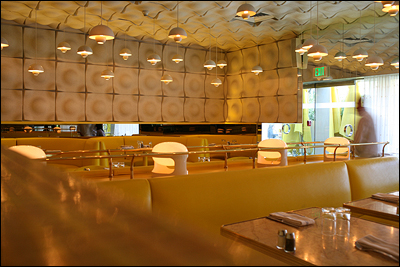
The 24/7 Restaurant. Photo by Zoetica Ebb.
Oh, internets. So close, yet so far.
Yeah! I said “come on, let’s meet up!” She said “yeah, sure,” so we met up the next week and wrote solidly for four days and came up with three songs. Now, there’s another element that comes into this, which is the musician Shok, from My Life With the Thrill Kill Kult. He was providing us with beats and loops, bits and pieces that became part of the mix, essential ingredients in this witch’s cauldron that we were stirring up in my kitchen. [laughs] Then we went into the studio and we recorded. This session was, well, how shall I put this… it was very electric, but it was also cosmic and explosive. Let’s just say, there were lots of sparks flying–
A bit of drama to go with your vampires?
There was a lot of drama, my dear, to such a degree that we had to leave it alone for a bit. I walked out, actually. [laughs]
Oh nooo.
Oh yes. But now, finally, we have come back together. Shok and I are mixing the tracks that we recorded, which are now with him, and that’s nearly done. And I’m filming my part of the video with David Jude Thomas, the director I mentioned before, and Johnette is filming her bit, and we’re going to try and piece it all together and put that out in some form. As an offshoot of this, Shok and I continue to sort of carry the torch of the vampire theme, and have carried on working on more material, which has resulted in two really strong tracks that will be released as a 7” single limited edition, 7” single in November. We’re also making a film for that, which is quite special. We’ve got Juliet Landau appearing in it, who appears in Buffy.
Drusilla? Yay!
Yes. She’s going to appear as another kind of vampire in the video for this track called “Tidal Wave of Blood.” The other side is called “Bloodsucker Blues.”
Fantastic. Is Jill Tracy involved with this at all?
Jill Tracy is involved. She is great, yeah. She sings backing vocals on this “Tidal Wave of Blood,” and she also appears in the video and plays piano on “Bloodsucker Blues.”
Perfect. Well, it seems like everything is coming full circle. You penned “Bela Lugosi’s Dead” in what – in 1979, 1980?
That was in 1979. I wrote the lyrics for that, but it was very much a group effort.
Let’s talk about your solo work for a minute. Your album Estranged is so lovely.
Oh, thank you.
It’s very tender and funny and sad and uplifting. “I am frozen peas, you are the sun.” You auctioned off, what, 20 years worth of Bauhaus and Love and Rockets memorabilia on Ebay so that you could keep sole ownership and produce it yourself?
Yeah.
In that respect, you kind of led the pack. Now, obviously, more and more people are taking an auction approach, or the Kickstarter route, to freedom. It’d be great to pick your brain about how the corporate industry is falling apart. What do you think it all means? How is this slow collapse changing your career and the way that you produce music?
Well, I’m broke, like a lot of others. [laughs] I think it’s really double-edged because it’s exciting, because it’s liberating and it’s very much sort of like a throwback to the DIY thing and the punk ethic. Only now, that’s because you have to do that. You have to operate by the seat of your pants and really kind of wing it, and generate your own publicity. Well, it’s beyond publicity –
It’s patronage, honestly.
Patronage is the word. You have to generate your own patronage, yeah.
Then again, the incessant self-promotion must get exhausting after a while. With all due respect to those who can pull it off, it must be incredibly hard to keep up all of that grandstanding without taking a lot of time away from the artistic process itself.
Yeah. And there is just a whole sort of narcissistic element to it. Sometimes it’s just – it’s repulsive, you don’t want be so caught up in yourself. It can become a kind of sickness.
Right, you’re so intent on creating buzz, you stop creating art. Then again, you don’t have all of those hooks in you from the industry, or from a greedy major label, which is great.
Yes. You’re free. Then again, because there is so much out there and everybody is trying to push their own thing, it’s very hard for it to surface or to stand out. It’s very easy to get lost in that vast ocean. There are so many little fishes in that ocean now–
— more like krill, at this point.
Yes. I can remember a time when it was very different. I was talking to Alan Moore recently, and he came up with this notion that I agree with completely: that there was a time when you basically knew just about everything that was out there that really mattered at any given time. And now, not only has that time passed, it just seems absurd. There’s no way you’re going to convince yourself or anyone of that. But it also points to the illusion of that perception: you might’ve thought that you were aware of everything that was of any worth, but you weren’t, because there was so much out there that would have just remained undiscovered, because there wasn’t this vast outlet for it, or any way to advertise its own worth.
It’s a paradox. Like, intrinsically, this almost infinite sea of knowledge loses resonance, because an entire culture takes it for granted that it’s infinite, and freely available to them…
Right. Regarding labels, you don’t have the machine behind you [when you self-release]. We did benefit from that, especially Love and Rockets. They’re putting money behind you to get you out there on the road. When we used to tour, we took it for granted that we would lose money on every tour we made, but the reason we were doing it was to promote ourselves so the people bought our CDs and records. That’s where we’d make the money. But now it’s like the reversal of that… only you have to have a certain like, marquee name in order to make that money. You’ve got to have a brand, as such, and if you haven’t achieved that, it’s very hard to establish it on your own.
So Love and Rockets had huge support on most of your records?
We had huge support up until the time when we discovered Ecstasy and went mad. [laughter]
That was when you went really electronic, right?
Yeah. We were recording in London in 1988 when acid house had just started and we started picking up on that, and –
–did you get to know Genesis P-Orridge around then, or before that?
I’ve known Gen since 1979, that’s when we met. And Bauhaus played with Throbbing Gristle. But yes, at that time in the late eighties, he was very much at the forefront bringing acid house over, you know?
Yeah.
We knew that it was the way we wanted to go with Love and Rockets, although it was commercial suicide. We made this experimental album that was inspired by [the genre], but it was our own sort of vision of it.
Was that Lift era, or…?
It was before that. A record called Hot Trip to Heaven. I mean, we’d just had a big hit with our last album and single, and RCA were ready to push us into the sheds, the small stadium venues. They said “we want guitar, lots and lots of guitar!” and of course, there was almost no guitar on this record at all. It was just really off the wall and out there. At our presentation meeting with RCA, they did not know what to make of it. They said, in a very kindly manner, “if you want to leave the label, there is no problem.” [laughter]
Oh dear!
Yeah. Instead, we signed with Rick Rubin. He got it. So we went with American Recordings. He said “what you should do is put this record out on a white label without any name or anything, get it to the electronic DJs and just get a buzz going underground, anonymously.” But we were so proud of it. Making it was a pretty brave thing to do at that juncture.
Yeah, of course. Particularly in the context of its time, that was an enormous, experimental risk.
Comparatively, I don’t think it’s out of line to say that it was our OK Computer, you know? We were really pushing ourselves, and stretching. So we didn’t go for Rick’s idea, we wanted our name to be attached to it. But in retrospect, I think that was a very clever idea, and it could have worked.
Speaking of Alan Moore, longtime fans of your various collaborations —Moon and Serpent Grand Egyptian Theatre of Marvels, V for Vendetta, The Birth Caul, and of course, The Sinister Ducks— will want to know if you’re still in touch with Moore, or have any projects in the works.
We don’t really work together but we communicate.
Aw, nuts. [laughter] Well, as long as we’re talking about buzz, along with magical things like vampires and ghosts and reclusive snake-worshiping graphic novelists, we have to discuss your mysterious Bauhaus-era side project, the Bubblemen!
Quite right. [impish grin]
Do you have any anecdotes that haven’t been published, concerning that sweet, oft-overlooked cul-de-sac of non sequitur wonderfulness?
Well, that started out as a doodle that Daniel did, so it came from the subconscious of Daniel Ash, and then this whole mythology blossomed around it. We saw them as ambassadors of peace and goodwill and positive vibes. They were benign aliens, and they were clowns, and they were funny, but there was a serious intent behind the clowning. Kind of just “Be sorted, everyone. Stop fighting! Get rid of the stupid bombs and all that crap. Just have a good time. Sorted!” You know? “And if you don’t do that, well, then we’re going to knock you around the head, make you fall over and then you’ll think, ‘oy, why am I lying in the mud? Oh, because I’ve been stupid, and I’m shooting somebody, I better stop doing that!’” You know what I mean? Then I discovered Hopi Indian Kachinas. And that the oldest one –I saw this thing in a museum– it’s this ancient doll, and it’s basically an elongated Bubbleman. I don’t know if you’ve seen this one?
No!
It’s got black and white bands, it has the antennae, big eyes, and a smiley mouth! So I had to research it, and then I found that yes, in fact, it is the oldest Kachina on record, the oldest spirit and the most sacred one in Hopi mythology. It’s a sacred clown called Koshari and its whole function is that of a Bubbleman, to do exactly what I just described. It exists to get people onto the right spiritual path through its clowning. Isn’t that interesting? So I think Daniel was tapping into an archetype.
How about that. You guys manifested tulpas.
Yeah, something like that!
Okay. More manifesting, now. This is a perennial favorite Coilhouse question we love to ask: imagine you’re arranging the ideal dinner party for up to 15 guests. You may invite anyone you like. Living or dead, person, god or figment. Who would you most want to break bread with?
[grinning] Jesus and Salvador Dalí. At the opposite ends of the table. Oscar Wilde. JG Ballard. Peter Ustinov. Dorothy Parker. Henry Miller. Jack Nicholson. William S. Burroughs. Orson Welles. Marlene Dietrich. Joe Orton. Bette Davis. John Lennon. I get to sit in between Dot and Bette, and opposite Marlene.
Excellent choices. So, other than the vampire project, what do you have in the works in the next year or so?
Yes, there’s a project that I have wanted to do for long time and I’ve been waiting for the right venue and the right time. Recently, both have appeared. I am taking The David J Ensemble [previously known as Cabaret Oscuro] to The Supper Club for a special engagement based around the live performance I’ve been doing off late, which is a more sort of leaning towards cabaret, as in European cabaret, with a core band of Tony Green on stand-up bass, Susan Constantini Green on piano, and Ysanne Spevack on violin and viola. It’s going to be a themed show called The Gilded Darkness – Songs from the Shadow Side of Hollywood. We’ll perform some covers, some really old songs like “Boulevard of Broken Dreams,” and songs like “Cracked Actor” by Bowie, as well as some of my own songs, like “Life in Laralay” and “Tinseltown” and “Bela Lugosi’s Dead”.
Will you tie in some of your Black Dahlia work, too?
Yes, I’m going to do “Indelible Blue” with Abby Travis singing. We’ll also do theatrical set pieces to illustrate some of the songs. A big production with a string quartet and additional musicians. It will be two nights in a row.
Exciting! Keep us posted, please. All of your music videos have a really strong visual and thematic cohesion (most notably Bauhaus and Love and Rockets, but that goes for countless other projects as well). It was difficult to track information down about any of them online… did you direct any of them or otherwise have a lot to do with their concepts and aesthetic?
I always have a lot of input. That goes right back to the early days of Bauhaus, you know. With all of the film and video projects I’m involved in, it’s very much a collaboration between myself and the director. Currently I’m working with a really brilliant director, David Jude Thomas– we’ve been working together for about five years, filming like cinéma vérité kind of stuff, and he has been following me around, so we’ve got a lot of material. We did a big production when I played in town here at The Cavern Theatre– they bought down these deluxe cameras, cranes, a little crew and everything. We filmed two nights, and we’re cobbling all that footage together to put out a live DVD.
What’s going on these days with you friends and collaborators, the Nortec Collective? Are you still in contact with those guys?
Yeah, very much so.
They’re fantastic. So underrated.
They really are. It’s a shame that they’ve split into different factions now, and it’s quite bitter. But I’m still friendly with both camps. Just before that happened we were recording music and we cut an album called Desierto. Everyone still wants to bring that music out, only what was originally intended to be one album is now two EP’s, one with Roberto [Amezcua], and one with Pepe [Mogt]. It’s very filmic music. Instrumentals that would be great to place in a movie. There’s one track where I’ve added vocals because it was so suggestive of this idea. It’s a poem by this brilliant English writer, Jeremy Reed, called “Lorca’s Death.” And that’s a lead into something that I really should tell you about, which is an album that is going to be released next year, it’s something that’s come together over the years.
Yet another project? Separate from everything else you’ve mentioned?
Yeah. A collection of songs, all to do with mortality. Some covers, some originals. I never intended [a theme], I just realized gradually that something was coming together. Recording these different things in odd places at odd times. It’s going to be an album called Not Long For This World.
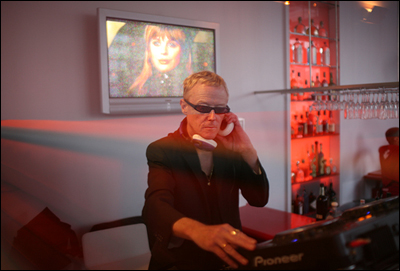
Photo by Zoetica Ebb.
When you’re not cutting records, you’re spinning them. You say on your website that you’ll play all kinds of DJing gigs. Have you ever actually played a bar mitzvah?
I’ve never done that, but I would! Could have a bit of fun with it, ay? I like taking every situation and putting a spin on it so it’s never the same set. Here [at The Standard Hotel], I do a very specific thing to suit this environment, to enhance the experience. It’s hyper lounge. You can really immerse yourself in this fantasy life. It’s like being in this particular movie.
When did you get started with professional DJing gigs?
I suppose it was about ’96. I had a residency at the Viper Room. My wife suggested I should do it to make money, because I love DJing so much. She knows that better than anyone; I’m always spinning records for her and friends who come ‘round. I’m just really enthusiastic about music. In fact, I just read this book by Arthur Phillips called The Song Is You, talking about that [kind of love]. It’s excellent. Highly recommend it. [Phillips] is so good at describing the DJ’s process of how music suggests other music– how there can be just some little harmony in one record that’s suggestive of a lead part in another record and it goes on and on from there – he gets that process just right. Each chapter is based on a song in his iPod that relates to some significant event in his life; it’s quite a brilliant device. But anyway, the Viper Room is where I started. Actually, I was there when Tenacious D were just starting out, so I got to meet Jack Black and Kyle Gass way back when. Just recently, I saw them again for the first time since those days– I was asked by Frank Black to do a charity show at the Echoplex here in town. It was a fundraiser for a baby that was in a pretty bad way. The parents couldn’t afford the medical bills, so Frank and his wife, Violet, put together these two special nights. One was comedy night, one was music, and Tenacious D did both. So, I got to see them again and remind Jack, “hey, remember the Viper Room?” They used to do some really crazy stuff back then, before they got famous.
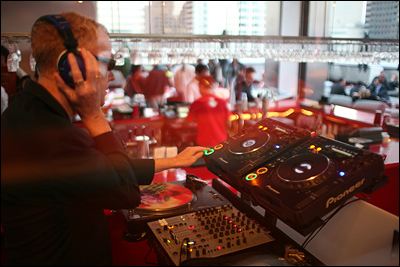
Photo by Zoetica Ebb.
They’re hilarious. Actually, you know, speaking with you at length, there’s no ignoring the fact that you have this amazing sense of humor. It’s a side of you that doesn’t necessarily get shared as much as it could. Who are some of your favorite comedians?
God, that requires a long answer! Well, I used to love Monty Python as a kid, and I adore some of that really old vaudeville comedy stuff. Mainly English comedians, but quite a few Americans as well, W. C. Fields was great. Morcombe and Wise. Mmmm, let’s see… Beyond The Fringe, Peter Cook, Dudley Moore, Alan Bennett and Jonathan Miller. The Mighty Boosh. Little Britain. Ricky Gervais. Tony Hancock. Stephen Fry. Patrick Cambell & Frank Muir. Willie Russell. Vivian Stanshall. Woody Allen. Leonard Rositer. Russell Brand. Harry Enfield. Bill Bailey. Lewis Black. Steven Wright. Eddie Izzard. Larry David. Jerry Seinfeld. Steve Coogan. Jack Dee. Tommy Cooper. Bill Hicks. The Goons: Spike Milligan, Harry Secombe, Peter Sellers.
Peter Sellers would make an excellent cosmic dinner party companion.
Oh, but you’d have to catch him on the right mood though, from what I gather.
That’s true. He might try to slit his wrists with a butter knife.
Yeah. I love the story about how he died. What a way to go out. Do you remember the circumstances of Mr. Sellers’ demise?
Nope. Please enlighten us.
He was on the job with Britt Ekland. He suffered a heart attack. But he always said to the other Goons, “when I’m finally incinerated at the funeral, I am going have this particular piece of music playing.” And when he told them what that piece of music was, they’d all laugh; they all thought he was joking. But sure enough, at the end, when he was being ceremonially cremated, and his coffin was slooooowly rolling toward those funeral curtains, what strikes up but Glenn Miller’s “In The Mood”? Isn’t that brilliant? [laughter] “Dah duh DAH duh dah DAH duh dah DAH dah duh DAAAH.” It has that stop/start ending. Imagine it! And you just see that coffin rolling excruciatingly slowly away, through the curtains…
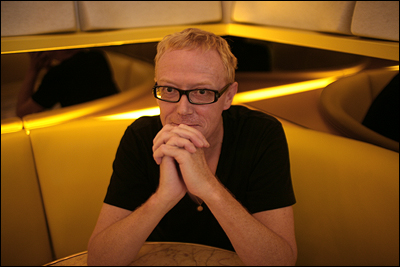
David J’s impish grin. Photo by Zoetica Ebb.
There’s an interview with you from around the time Estranged came out, where you said “have no regrets. No matter what happens, it occurs because it is meant to happen.” Conceding that, is there still something that you would have perhaps wanted to go back and tell your 20-year-old self, if you could?
I would say, “don’t take your self so bloody seriously, mate! And don’t sweat the small stuff, because it is ‘small stuff’! Also, try and slow down a bit so that you can see the punches coming. The punches and the kisses!”
Can you name a few younger, newer bands that you find inspiring?
Glasvegas. The Horrors. My son’s turning me on to stuff now. I turn him on to stuff as well, it’s great. He played one the other night which I really liked, ’80s Matchbox B-Line Disaster. I also really like LCD Soundsystem, Fuck Buttons, and the Black Angels.
Your son must be like a kid in a candy store with your record collection!
Yeah. You know, it’s really interesting, having a 22-year-old like Joe. He reminds me of me when I was at that age, just being very curious, just a sponge.
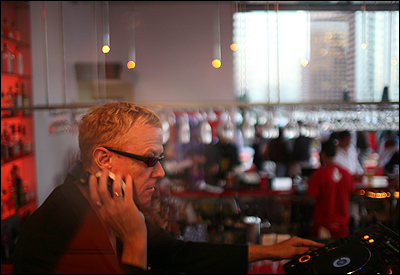
Spinning hyperlounge on the roof. Photo by Zoetica Ebb.
It can be such an earnest, open age. Hopefully, no matter how old you get, you can hold onto some of that openness, and keep soaking things in.
Yeah. Nowadays, in a way, it’s so much easier and so much harder at the same time. It was hard for my generation to find stuff, but that was part of its allure and mystique.
Right. The more obscure it was, the more it could feel like being initiated into the mysteries of some secret society. [Elitist as that might sound.]
You really had to search things out because there was no computer, but now–
–like you had to “earn it” a bit more. But of course that’s all relative.
Yes, well, now we’re circling back to the start of this conversation about how it’s all out there, but there’s almost too much. But still, there are plenty of things that my son is really intrigued by, about which there isn’t much information. I turned him on to this band, Lo Fidelity Allstars, that I loved when they first came out. Their first album How to Operate with a Blown Mind, was this great, very original record from the early 90s. They were kids coming from rave culture, making their own synthesizers with this very punk ethos, but coming from warehouse parties and also into music like Funkadelic, Parliament. They all had these crazy names… the singer was known as The Wreked Train. He was a real poet, writing this kind of Burroughsian cut-up, this collision of ideas that he’d just be spewing out. Very vivid, very exciting– but he disappeared. I remember while I was on tour with Bauhaus in the late 90’s in Vancouver, I found out the Lo Fi Allstars were playing were playing a rare show in Washington, D.C., and I took it upon myself to get on a plane to fly to see them. I was that keen. So, I got to the venue and they were late, they kept delaying the show time. One hour, then two hours went by. Finally I went to see the sound guy. I said “what’s going on?” Sound guy said, “Oh, the singer’s fucked off. “ I said “Wrekked Train, ay?” He said “yeah, more like fucking train wreck.” And he never came back. But anyway, my son was fascinated. He played and loved the record, and when I told him the story about that show, he got so intrigued. So now he has found this record that The Wrekked Train made, this one record he made after leaving the band. There’s a lot of stuff like that. Keeps everybody young.
Well, as a creative person, or even more generally, as a consciously, actively present individual, what other advice would you give to younger generations, or any of us really?
Unplug and slow down, take a deep breath, and look at the slow-moving shadows. But then remember to plug back in and tell us all about it.

Photo by Zoetica Ebb.

Downtown LA skyline, sundown. Photo by Zoetica Ebb.
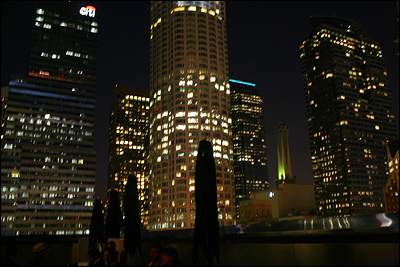
Downtown LA at night, viewed from the Standard’s Rooftop Bar. Photo by Zoetica Ebb.

November 1st, 2010 at 1:17 pm
Aww what a great interview. Dad’s Garage! I worked with them on their first production many moons ago on “Cannibal the Musical.”
I bet that do great things with David J’s material!
bun
November 1st, 2010 at 3:21 pm
This was a wonderful read. Thank you.
November 1st, 2010 at 10:11 pm
this was AWESOME!!!!!!!!!!!!!!!!!
November 2nd, 2010 at 5:20 am
awesome !! what incite! what delish memories!!!!thank you…..
November 2nd, 2010 at 11:08 am
Thank you for that – I’m so jealous! Bauhaus were the first band I ever saw live, way back in 1982. First love never dies!
November 2nd, 2010 at 12:42 pm
Thanks for this…Love & Rockets was my favorite band, and I have a jillion great memories of the music.
November 2nd, 2010 at 1:36 pm
Awesome interview! But where’s the love for The Jazz Butcher?
Caroline Wheeler’s Birthday Present…is made from the skin of dead Jim Morrisons.
That’s why it smells so bad!
November 2nd, 2010 at 1:55 pm
Shit! I knew I forgot something!! Bjacques, I’ll try to at least throw a youtube clip or link in there somewhere… cheers!
Thanks for the kind words, all. Glad you’re enjoying it. We definitely had a lot of fun putting it all together. :)
November 2nd, 2010 at 2:59 pm
Such a good read and a thorough interview! Well done, ladies!
November 2nd, 2010 at 8:18 pm
Great interview1
I am wondering what record Wrekked train made? Google not helping me tonight…
November 2nd, 2010 at 9:53 pm
Great article.
Btw, our ep can be streamed here:
http://bit.ly/b1P7X4
You can hear our work with Johnette Napolitano on http://myspace.com/tresvampires or a better sounding version:
http://bit.ly/dcD5WM
Enjoy! :)
November 3rd, 2010 at 7:59 am
Wonderful, so very very enjoyable to read. Can’t wait to read it again!
And those Koshari remind me of that show, Aah, Real Monsters: http://www.imdb.com/title/tt0108684/
November 3rd, 2010 at 8:16 pm
Wonderful interview…what an amazing fellow! Thank you Mer!!!
November 4th, 2010 at 10:14 pm
I didn’t get where I am today without knowing a great interview with the wonderful genius David J when I see one!
C.J.
Sunshine Deserts